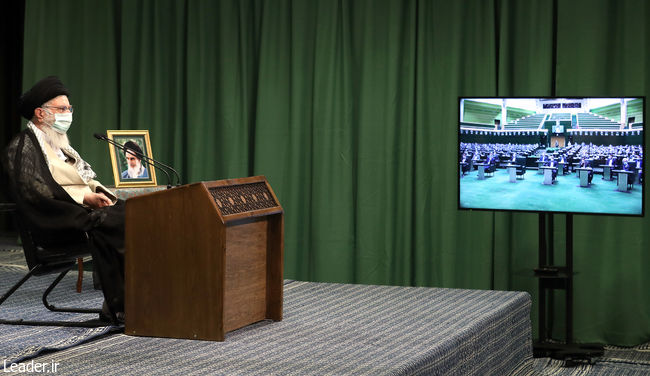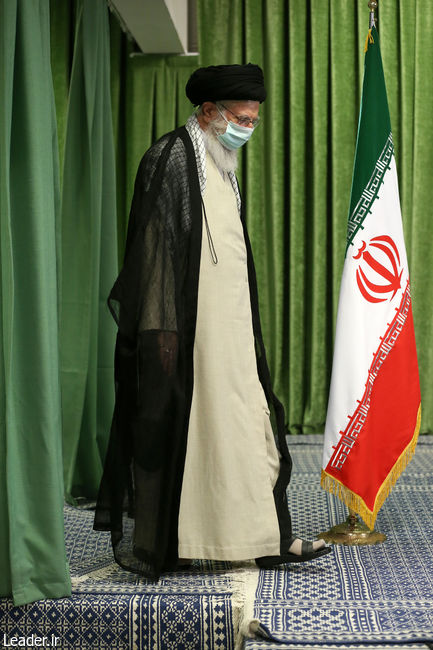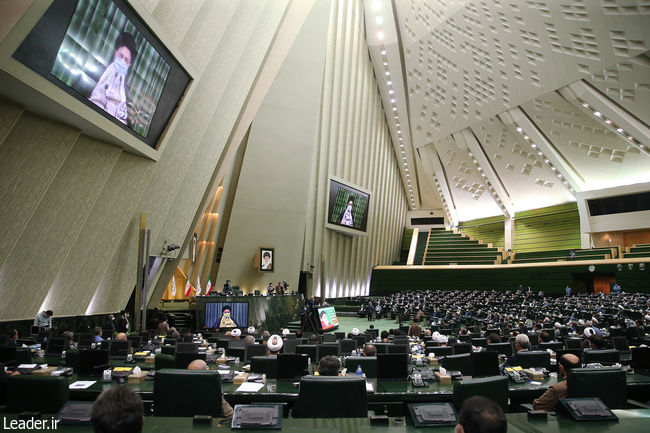Meeting of the Leader of the Revolution with Members of the Islamic Parliament of Iran
If the candidates for the presidency assure the people that they can solve their economic problems, their participation in the elections will increase.
On Thursday morning, May 27th 2021, the Leader of the Revolution held a virtual meeting with the President and representatives of the Islamic Parliament of Iran. In an important speech about issues concerning the recent elections, he said that if during the election process, the candidates would speak in detail on fundamental and realistic ways of solving the people's economic and living difficulties, this would be a key factor for increasing their participation in the elections.
In elaborating on the do's and don'ts of electioneering, he emphasized that the effect of election outcomes will have a lasting impact upon the lives of the people and the country. "We hope that the elections of June 17th would be a source of respect, honour, and pride for Iran despite the hopes of our enemies".
The meeting coincided with the second year of the eleventh session of the Parliament. The Leader also shared his recommendations to the parliamentary representatives about the characteristics of wise and revolutionary action, about making indefatigable efforts, and talked about efficiency and focus on the widespread welfare. He added, "Just like what our beloved Imam said, all parliamentary sessions should represent the quintessence of the sum total of the highest virtues of the people".
The Leader said that the Parliament demonstrated hard work over the last year, great ambition and efficiency. He also mentioned that the presence of a young and capable force working alongside those with legislative and executive experience made it possible for the Parliament to propose and pass bills. He thanked the President and the members of Parliament for their meetings with the people and their trips to the provinces. In this respect, he said, "This is a very good move, and you should continue to do so; you must always remain connected to the people." He mentioned that those who generated a negative image of the eleventh Parliament did so from an unsympathetic and unconstructive point of view and added that some criticisms are intended to solve problems and perfect things, but generating negative images does not originate from those intentions. Members of Parliament should ignore this type of behaviour, continue fulfilling their responsibilities and in word and deed, not give excuses for our enemies and those who oppose us.
In his speech to the elected Members of Parliament, Ayatollah Khamenei added, "Real development is continuing the Revolution, and preserving such values as struggle and constant endeavour. This is because, in the Holy Qur'an, God sends down the angels of His mercy upon those who are on the Straight Path and strive to remain on it." Referring to the gradual deviation of some of the members, the Leader of the Revolution said, "In the beginning, some of them were very active and eager, however, the temptations of fortune, position and popularity made them crooked and turned them around 180 degrees. Maintaining the Revolution requires constant vigilance and accountability over oneself," and he added, "The real meaning of Godwariness or piety is continuous vigilance over oneself when one is confronted with making the wrong choices and mistakes."
The second piece of advice that the Leader gave was that parliament members should increase efficiency, have wisdom and be unflappable. He said, "Up to now, the parliament has been functioning well; however, forging a path to solving national problems requires something higher and more extensive and needs calm minds and the avoidance of rash and emotional behaviour." The Leader of the Revolution stated that the Parliament is the predominant manifestation of the collective wisdom of the society. He criticized people outside the Parliament who see being revolutionary as describing those who speak irresponsibly and emotionally. In contrast, he defined being revolutionary as having the spirit to act in a correct manner and being determined and self-confident in the right direction. He also saw Imam Khomeini as the epitome of being revolutionary and being intelligent. He was the most revolutionary of all; at the same time, he was the wisest, always speaking from experience and carefully measuring his words. In this context, one can say that the Imam did not come up short.
The Leader also advised that the members of Parliament review their performance. He considered the use of parliamentary powers motivated by personal, group or ethnic interests to place members under scrutiny, subject them to impeachment, and to conduct investigations are examples of corruption. He said, "These powers should only be used in accordance with the letter of the law and the truth." He also mentioned another example of corruption: when members of Parliament find themselves working on getting particular individuals into executive positions.
Ayatollah Khamenei also advised the members of Parliament to be careful and fastidious when they are on public platforms as members of Parliament. He added that sometimes criticisms in private could have a significant effect. On the other hand, public criticism in Parliament could be useless or even harmful. He said that they should avoid seeking ministerial or other executive positions out of nepotism and advised the standards committee to look closely into this. The Leader added that certainly, self-vigilance would be more effective.
In his following advice, he said that members of Parliament should rather completely rely on expertise in examining bills and elevating the quality of the law. He also noted that good laws should exhibit efficacy, applicability, explicitness, and clarity and that they should not be subject to easy misinterpretation. Members of Parliament should consult experts concerning parliamentary bills to increase their quality. The Leader also mentioned another point: the legislative branch of the government should propose bills regarding sensitive and essential issues rather than the Parliament. This is because the executive branch, as the one presenting the bill, will be more favourable towards it, and it will also enjoy the support of the experts among them. Regarding the issue of observing priorities, Ayatollah Khamenei said that, fortunately, the Parliament prioritizes its programmes; however, this subject should be taken seriously. In accordance with the slogan of the year, the country's main priority is removing obstacles to production and promoting it because reviving production boosts the country's economy.
As he had advised previous sessions, the Leader reiterated the cure for the parliamentary practice of enacting many laws. He said that by setting a deadline, a solution should be found to this problem.
One other piece of advice in his address to Parliament was quoting a wise sentence from Imam Khomeini, who said, "The parliament is the epitome of the virtues of the nation". He said that this means that, as it has been in the past 42 years, the nation's virtues have been manifested through struggle, sacrifice, dignity, self-confidence, hope, and the ability to bear hardship.
In the other part of his speech, he spoke about the presidential election. He said that the enemies are using all their resources to make the elections an embarrassment for the nation, and other people consciously or unconsciously incite the people by echoing their words. However, he said that he was very hopeful that with God's help and the nation's efforts, this election is going to be a source of pride and dignity for the country. He talked about the process by which the Guardian Council screens presidential candidates and said, "I should thank all of those who ran in this election out of their sense of duty and furthermore, I offer my thanks to those who didn't qualify and still gracefully, when they encouraged the people to participate in the elections, I thank them even more. He said that when a candidate fails to qualify, it did not mean that they were really unqualified; it meant instead that in terms of its capabilities and knowledge, the Guardian Council could not determine the applicability of that person based on the reports it had at its disposal, and that in fact, that person may have been more applicable than ever. Regarding challenges levelled towards the Guardian Council, he said, "There are certainly different motivations behind them; some challenges are supportive of the country and have concerns about low participation in the election and others are upset that their favourite candidate was disqualified and we cannot criticize them. On the other hand, some oppose the Guardian Council per se and seek revenge by disseminating material on cyberspace and in print media, and God will not forgive them for this."
Regarding some concerns about the low turnout for the presidential elections on June 18th, the Leader said, "I don't believe that the level of people's participation in the elections is based on this or that individual, rather the people are looking for someone who has strong managerial skills, firm determination and who is very efficient in solving the country's problems. Titles or political affiliations are not important. This issue might be important for political parties, but for the general population, this is not the case". The Leader said that instead, it was vital that candidates convince the people that they know the problems of society, that they are capable managers, that they are honest and that they can run the country. It is only then, by the grace of God, that the people will show up at the polling stations in great numbers". In addressing some comments that candidates must take a stance about cyberspace and also foreign policy, the Leader emphasized that people are not concerned about these matters. People are worried about youth unemployment, the life of the poorer classes, and the import mafia that destroys (break the back of) local production, making innovative, enthusiastic youth fall into despair and make hard-working farmers helpless and destitute. He added, "Recently, I cautioned the relevant authorities about the situation of the farmers because the farmer generates agricultural produce with great efforts and suffering. However, incorrect policies and damaging imports destroy their lives, and their profits go into the pockets of middlemen.
Ayatollah Khamenei said that anyone who is going to be in charge of the executive branch of the government must be aware of the main problems and issues of the people and must be able to solve them. He added by saying that if they can do that, the country would definitely prosper. He saw political and cultural affairs as very important. However, he said that the most urgent and pressing issue is that the economy and candidates must present their plans to the people and convince them that they can solve these economic problems.
The Leader commented on the opposition of the nation's enemies to the elections. He said that this opposition began from the time of the victory of the Revolution, especially after the amendment of the Constitution that transferred executive powers to the hands of a president. During these 42 years, he said, before elections, the enemy would proclaim that the people would not participate, then, after the people came to the polls, they would claim the elections had been manipulated, and then they would maintain that the president-elect had no power. He said that they have been playing by this script ever since that time. He said that the enemies of the nation work hard to make the people think that elections and electing the President are useless activities. Unfortunately, some people in the country echo these accusations and try to build theories upon them. In spite of these animosities and propaganda, we should rise to our responsibilities in accordance with our religious duties and for the sake of God.
Ayatollah Khamenei warned the candidates, their supporters and the general public against making the elections a shameful event by making it a stage for power struggles and trading insults which is so common in the United States and some other European countries. He said, "The country was the only one that lost when in previous presidential debates and campaigns, destructive methods were used, such as insulting behaviour and scaring people about rival candidates". He emphasized that elections should be an arena where people compete in service and goodness and be a forum where insults and condemnations are avoided. They should prevent unrealistic and deceptive sloganeering and said, "They should only make slogans and promises based on the country's capacities and realities".
His following advice to the candidates was that they should rigorously observe ethical principles, refrain from breaking the norms of proper behaviour, and cross the system's red lines. He said that keeping Islamic ethical principles in debates and interviews will trickle down society and act as a model. He added that in order to attract a greater audience, some people cross the red lines of the system when the Islamic Republic of Iran is a stable one and firmly fixed. With these divine and popular red lines, the Islamic Republic has stood up against adversity and breaking these norms will not lead to a better situation among the people.
The Leader addressed the candidates' supporters and said that the divine intention would cause blessings and divine satisfaction regardless of the election results. He said, "Sometimes supporters are more extreme than the candidates themselves, and this can lead to conflict and the use of offensive language against each other. They should be careful in this regard because the enemy wants to create strife between them by using cyberspace to spread disrespectful language and disseminate lies about each other". He also said that the enemy's inclination to cause disruption runs deep. Indeed, sometimes in cyberspace, some issues can stand out but may not be actually representative of the people's wishes. He asked the candidates to make a promise between themselves and God that they will humbly accept the results of the elections, whatever they might be.
Ayatollah Khamenei mentioned that we should not accept democracy only as long as it is our favourite and rejects it when it is not, which unfortunately was the bitter experience that has remained after the 2009 elections. At the end of his speech, he addressed the Iranian nation, saying, "the elections take place only for one day, but its consequences last for many years. Participating in the elections is relevant to you, so ask God Almighty to help you to vote for someone qualified for this responsibility".
The Leader stressed that people who discourage others from taking part in the elections by implying that elections are useless are liars. They do not take the people's interests to heart, so the people should ignore what they say.
In a similar vein, reminding the people of the importance of city and village council elections, he said, "These elections greatly impact the administration of cities and villages". He hoped that Divine guidance would guide people to fulfil their duties and asked influential figures to use their influence to promote the elections.
Before the Leader's speech, Mr Qalibaf, the Speaker of the Islamic Parliament of Iran, gave a report on the most important legislative and supervisory initiatives that had been achieved in the first year of the eleventh session of the Parliament.
He mentioned the prioritization of economic issues and living standards by passing laws like the law for the people's economy, passing laws for housing development and reducing house prices, establishing tariffs on the purchase of agricultural products, forcing the executive branch to give subsidies to people on essential goods, tax reduction in favour of production units, allocating 200, 000 billion rials for reducing poverty, attempts to reform the structure of the budget, reforming the banking and taxation systems and critical rulings on strategic initiatives in the nuclear programme.



